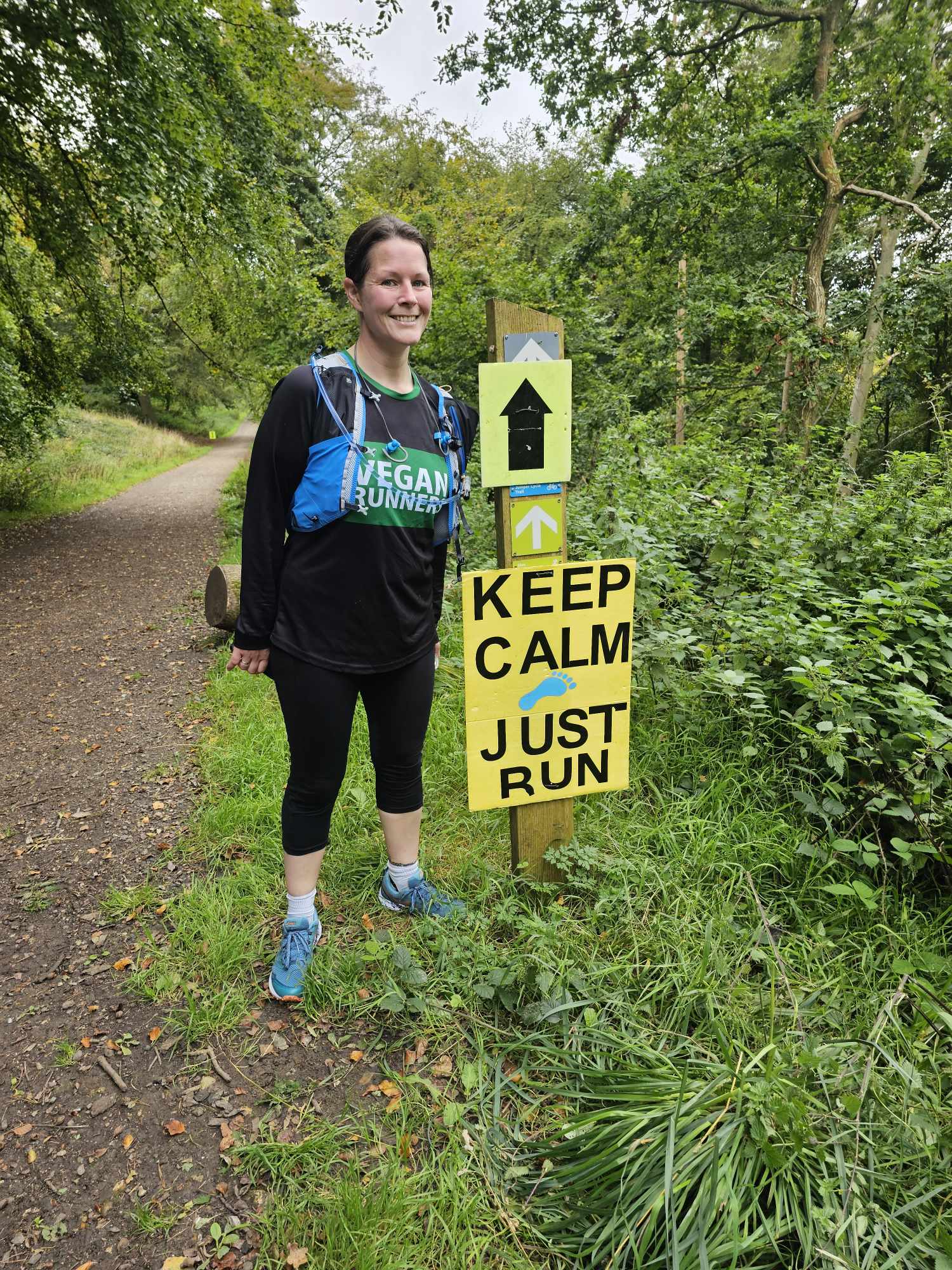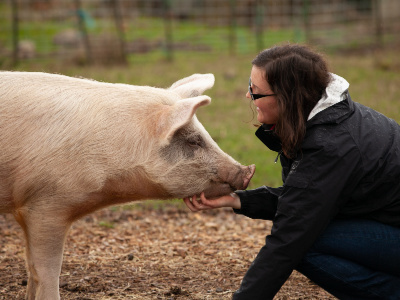When we asked Veganuary participants about any positive changes they had noticed through trying a vegan diet, we were surprised by how many cited an improvement in their mental health.
We have to admit, we were intrigued! And so we decided to find out more, dig into the research, and see if eating plant-based might positively impact our mood, outlook and resilience.

Safiri’s Story: Pride in Her Achievement
Safiri from London took part in Veganuary 2024. “I signed up to Veganuary with the goal of reducing my carbon footprint after becoming increasingly interested in sustainability,” Safiri told us.
“I had already achieved this in reducing my water and energy usage, using solely public transportation or walking, and minimising my material purchases by making and upcycling. However, I believed the most challenging change would be my diet, which is why I thought the support of Veganuary would make it easier.”
Safiri found the vegan month was both eye-opening and enjoyable, and it aligned with her own proven commitment to better protect the planet. Interestingly, one of the unexpected benefits she reported was an improvement in her mental health.
“I’m sure a key factor in this was biological, in that eating healthier food made my body feel better, which made my mind feel better. But mostly I found that my mental health improved due to my pride in myself. It felt amazing that a small (and delicious) change I was making was helping the environment, and that really fuelled me to continue.”
Astutely, Safiri pinpoints three ways in which Veganuary may be able to boost participants’ mental health: first through the achievement of successfully adopting a vegan diet for one month, despite it seeming quite a challenge!
Second, it may improve because we are making changes that align our actions with the issues that really matter to us. And third, mental health improvements could be a wonderful by-product of the physical health improvements that many people experience after switching to a healthy plant-based diet.
And when we spoke to other Veganuary alumni, their stories bore this out.
Francesca’s Story: Eco Anxiety Reduced
It is well documented that the environmental crises we face have a significant impact on mental health.
Writing in the British Medical Journal, Mala Rao and Richard Powel from Imperial College London’s Department of Primary Care and Public Health, said that although eco-anxiety is not a diagnosable condition, recognition of it is increasing, and so too is the understanding of its disproportionate impact on children and young people.
In 2020, more than half of child psychiatrics in England reported environmental anxiety in their patients.
Francesca is 20 and recovering from restrictive eating disorder, caused in part, she told us, by eco anxiety. She took part in Veganuary but had been warned that it might not suit her.
“I was told veganism was bad for me because it was also restrictive,” she explained. “However, being vegan relieved my guilt of eating in the first place because I knew no one had to suffer before I sat and ate a meal. Veganism helped me find a reason to live for myself because I found strength in knowing I was causing less harm to the environment and animals, which was one of the reasons I got sick in the first place.”
Francesca continued with a vegan diet after Veganuary and found that it has helped reduce her anxiety and recover her sense of equilibrium. “I have more energy, emotional balance and an alignment of lifestyle and morals,” she said. And we could not be happier for her.

Ashley’s Story: Taking Back Control
Ashley from Croydon took part in Veganuary in 2019. “I had decided the ‘cold turkey’ approach was best for me,” she explained, as she had already spent a long time considering becoming vegetarian without ever making the switch.
But after watching Cowspiracy something clicked, and Ashley knew it was time. “I decided it needed to be all or nothing for me,” she says, “and I went from a meat eater eating the worst of the worst to plant-based only and I LOVE it.”
Like Francesa, Ashley had long experienced anxiety about the state of the world. “I grew up with a fear of the ‘end of the world’ which honestly hasn’t changed,” she explained. “As a child I would have panic attacks about natural disasters even though we don’t really experience them in London. Going plant-based made me feel like I had a bit more control of that.”
Alongside the feeling that she was doing all she could for the planet, Ashley found her empathy and love for animals grew, and she knew to her core that this life choice had made her happier. “I became vegan for the planet,” she says, “but I remain vegan for the animals.”
Luna’s Story: Aligning Actions with Principles
Luna from Canterbury also took part in Veganuary 2019. She’d had a difficult relationship with food for many years and struggled with disordered eating. “I was a vegetarian who hated vegetables,” she says, but, after taking part in Veganuary, is now a vegan who loves them!
However, starting out on that path yielded bigger benefits than just learning to enjoy broccoli. Luna explains that it helped her “become more myself” because she was able to align her actions with her values.
The Brainfirst Institute explains the importance of this:
“Neuroscience and psychology reveal that [a] misalignment between values and actions can lead to chronic stress and burnout. The brain’s reward system, which is driven by dopamine, plays a crucial role in motivation and goal-directed behavior. When we pursue goals that align with our values, the brain releases dopamine, reinforcing our efforts and contributing to a sense of purpose and satisfaction. Conversely, when our actions are not aligned with our values, the brain’s reward system is less engaged, leading to feelings of frustration and emptiness.”
In short, if we care about the environment and animals deeply, and yet continue to support the damaging animal agriculture industry by eating meat, milk and eggs, it can cause internal conflict, which can have a negative impact on our emotional and mental wellbeing.
No wonder that this alignment between ethics and behaviour is something that crops up a lot among Veganuary participants. Closing that gap and making choices that support our values is a wonderfully liberating way to live.
Adopting a vegan diet has certainly had a profound effect on Luna. “I have found a huge community of vegans during my journey and have undergone experiences speaking up for animals that I was too afraid to do before,” she says. “Going vegan truly has turned my life around for the better.”
Linda’s Story: A More Positive Future
Linda from Norwich has taken part in Veganuary a number of times and says she always looks forward to the next one coming round. Linda has been vegan on and off since her late teens, and for her, the motivation is primarily for animal rights, but says she also feels better in herself too. “Feeling less full of corpses which feel quite heavy is a great thing,” she explained.
Linda believes that the improvement in her mental health comes from looking to the future and “just knowing that each thing we pay for that is vegan is paving a way to a kinder world. It really does help overcome that horrid feeling of the abuse being too much and too engrained in human behaviour to ever change.”
There is also a lot to be said for becoming part of a passionate global community that is working together for a kinder world, and this is something that has also given Linda a real boost. “Knowing that combined we make a tidal wave of change really helps,” she said, “and that wonderful feeling of solidarity – knowing I am one of many.”

Better Health, Bigger Happiness
“I went fully vegan in April 2018 after trying it out during Veganuary that year,” Kristy from Bedford told us. “And I am fitter and healthier than ever. I’ve been serving in the RAF for 15 years and the last 6 years I’ve had more energy, and I haven’t sustained an injury running or weightlifting since going vegan. I make all of my purchasing choices based on ethical veganism, including sourcing new uniform (where possible), which gives me great peace of mind. All in all, I’m mentally and physically happier and healthier.”
Kristy’s experience got us thinking about the connection between good physical health and improved mental health. And it is obvious why people who experience discomfort, pain, or illness might find their happiness quota increasing when it is reduced or removed.
Bethany from Chester had been vegetarian since 2018 but found her weight had crept up and up. “I think it’s a case of putting cheese on EVERYTHING and being tempted by the large selections of dairy chocolate in the shops,” she explained. “I would often get acne around my chin which was annoying to have when in your late 20s, but after cutting out dairy it’s now extremely rare to get any spots at all.”
That’s very positive but there soon followed a rather joyous development for Bethany. “After removing dairy, I feel much less sluggish and more motivated to incorporate exercise into my life,” she told us. “I now have the energy to go to dance classes weekly and take daily walks down the Chester canals!”
Bethany is not alone. Over the years we have heard some incredible health transformation stories from Veganuary participants, but we’ve also noticed that even the smaller ones – having more energy, being less sluggish, or noticing improved skin – can lead to a more positive outlook and a better quality of life.
Laura from Eastbourne summed up her Veganuary experience simply. “My health improved to another level, and I feel so much happier.”

What Does the Research Say About Veganism and Mental Health?
With so much positivity from our Veganuary alumni, we went in search of cold hard data. And, although there has been some research about the impacts of a plant-based diet on mental health, the findings are conflicting.
In 2022, researchers at Kings College London conducted a systematic review of all the studies done to date. They found that 11 studies indicated a link between vegetarian and vegan diets and depression, seven found that a plant-based diet actually reduced depression, and another seven found no connection at all.
Since then, the research has continued to yield mixed results. A 2023 Australian study found that a healthy plant-based diet could help relieve depressive symptoms while a 2023 Iranian study found that it was not associated with anxiety or depression in any way.
So, what are we to make of all this?
Plant-Based Diets and Depression
Within the above studies, there are some important variables that have not been fully teased out.
Many of the studies include vegetarians alongside vegans while others have not differentiated between how healthy the diet is. Think chips-and-doughnuts versus wholefood plant-based, and it’s obvious there would be some significant health differences there.
Junk Food or Plant-Based?
While many of the studies did not tease out this important distinction, others looked specifically at the outcomes of eating an unhealthy vegan diet versus a healthy plant-based one.
They found that, far from causing depression, eating a healthy plant-based diet could actually be beneficial for mental health. This backs up the existing evidence. A 2017 meta-analysis of 21 studies had already revealed a very clear link between any unhealthy diet – vegan or not – and depression.
Is There Any Link at All Between a Vegan Diet and Depression?
The evidence to date suggests that, if we eat a healthy plant-based diet, we are less likely to experience depression, but that if we eat a junk-food vegan diet, the outcome is less clear.
There is still more work to do to iron out those variables. In the meantime, sociology and psychology researchers have posited a number of theories that might offer an explanation about a potential link with depression that has nothing to do with diet.
They remind us that correlation is not causation, and that, if there is increased depression among vegetarians and/or vegans, it may not have anything to do with the nutrients they are consuming. These four studies provide food for thought.
University of Zurich researchers compared depression scores between meat-eaters, meat-reducers and vegetarian/vegans, and found that the meat reducers had the greatest risk. The researchers suggested this could be down to cognitive dissonance or “the stress involved in being aware of the problems with eating animals, while at the same time engaging in the behavior.”
They explain: “Meat-reducers actively and consciously weigh the balance between eating meat and not eating meat on a regular basis. The resulting experience of cognitive dissonance could contribute to psychological discomfort and depressive affect, as has been found in experimental studies on cognitive dissonance in other domains.”
They also found that “given the choice between listing themselves as vegetarian or omnivore, meat-reducers tend to self-describe as vegetarian”, which would, of course, skew the data and make it look more like vegetarians had an association with depression. And we already know that vegetarians and vegans were not separated out in the studies, which could have led to an erroneous connection between veganism and depression.
Research conducted at the College of William and Mary in Virginia looked at attitudes toward vegetarians and vegans and found that people often think more negatively about them than omnivores, and that it is possible that this has an impact on mental wellbeing.
Being the odd one out and knowing yourself to be judged unfavourably can certainly affect people negatively so this could hold some truth. Secondary research found that, if this judgement comes from family and friends, the distress is greater. The researcher noted that almost all minority groups experience more depression, and vegans – for now at least – remain in the minority.
A University of Zurich meta-analysis considered the personality traits of omnivores, vegetarians and vegans using the OCEAN model (Openness, Conscientiousness, Extroversion, Agreeableness, Neuroticism) and concluded that vegans were more open to experiences and more agreeable, making them more likely to be sympathetic to others and to act on those feelings.
However, it also made them more prone to a psychopathology that was totally independent of their dietary intake. Simply put, it could be that it is the nature of people who adopt vegetarian or vegan diets to have more of a risk of depression. Our fourth study backs that theory up and offers an explanation as to why that may be.
Research from Fern University in Germany, the findings of which were delivered at the PHAIR Conference in 2023, concluded that eating vegetarian or vegan in a world where people routinely eat animals is distressing, and for people who care passionately about animals this could be a cause of greater emotional disturbance.
This is something we know affects people. When you know the extent to which animals suffer, it can be very hard to live in a world where the bodies of animals, and adverts for them, are everywhere you turn.
Conclusion
We have heard from so many Veganuary participants about improvements they have experienced in their mental wellbeing, and they put this down to a variety of factors, from a sense of achievement to living according to their values, plus a healthy shot of plant-based nutrition!
Research into a link between a vegan diet and depression is conflicting with the studies not distinguishing between vegetarian and vegan diets, and many not looking at the quality of the diet either. When those variables are taken into account, one thing becomes clear: unhealthy diets – whether they are vegetarian, vegan, or omnivore – are more likely to be linked to depression.
But when we eat healthy plant-based foods, studies suggest that, contrary to there being a negative association, it can actually be beneficial for our mental health. Just as our Veganuary alumni discovered.
Feeling inspired by these stories? Read more Veganuary participants’ experiences and how taking part has improved their health.












